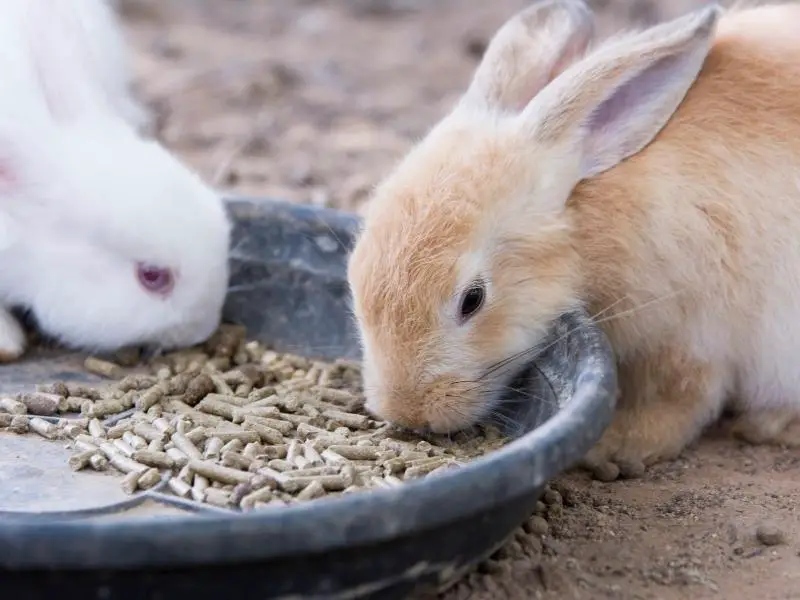Some religions and cultures have very strict dietary rules their followers need to adhere to. These dietary rules include meat consumption and even how an animal is slaughtered. Many people around the world enjoy rabbit meat because it is a lean, healthy alternative to other proteins, but is rabbit meat kosher?
Rabbit is not kosher because the meat is only kosher if the animal has cloven or split hooves and eats its own cud. Rabbits are cud-eating mammals; they need to eat cecotropes, and special poop to help aid their digestive system. However, rabbits have 4 webbed toes on one hind foot and 5 on one front paw.
Ready to learn more about why rabbits aren’t kosher and what are friendly alternatives to eat if you follow a kosher diet?
Is Rabbit Meat a Kosher Food?
Rabbit meat isn’t kosher, and any other lagomorph like a hare wouldn’t be kosher either.
Rabbits would be kosher if they fulfilled 2 criteria: these mammals need to have split hooves and eat their own poop.
Criteria 1: Cut-Eating
Bunnies are coprophagous, meaning they eat their own poop. The “poop” a rabbit eats is called cecotropes, which are cecal pellets or night feces.
A rabbit’s digestive system, or more specifically, the cecum, makes cecotropes because a rabbit first ferments its food in its digestive system.
The rabbit then eats the cecotropes, which are nutrient-rich, as they are excreted. As the cecotropes pass through the rabbit’s digestive tract, their body is able to absorb much-needed nutrients.
Once the nutrients are absorbed, a rabbit will have a “normal bowel movement” and excrete poop – hard pellets or droppings that they don’t consume.
Criteria 2: Split Hooves
So if rabbits are cud-eating animals, are they kosher? Nope.
A kosher animal also needs to have split hooves, also called cloven hooves, divided hooves, or cleft hooves. A split hoof is a hoof that is divided into two toes, which is also known as even-toed.
Ungulates of the Artiodactyla order like cows have split hooves.
Rabbits do not have split hooves, and thus, they aren’t kosher, even though they meet one of the kosher dietary requirements.
However, a rabbit has 2 front feet with 5 toes each and 2 hind feet with 4 toes each, making them somewhat different from ungulates.
Why You Should Not Eat Rabbits If You’re a Kosher Person?
A Jew who eats kosher is following the commandments as set out by the Torah. When Jews consume foods that are prepared in accordance with their God’s laws, they are reminded of their heritage and may feel closer to their Creator as a result.
There is no punishment on earth if a Jewish person doesn’t eat kosher.
Jews believe that their God will dole out punishment one day as He sees fit. But the person may feel guilty for not abiding by the kashrut, Jewish dietary laws, or regulations, which may be punishment enough.
In the olden days, Karet was imposed by the Torah, which meant capital punishment, banishment, or a divinely imposed execution. The Talmud states that anyone who doesn’t abide by kashrut should receive 39 lashes (Makkot).
What Makes Food Kosher?

There are different rules (depending on the kind of food) that make the food kosher or not.
Here’s a brief summary of what makes certain foods kosher:
Animals and Meat
- Kosher animals are those that have cloven hooves and eat their cud. Only the forequarters of these animals may be consumed.
- Domesticated fowl like turkey, quail, chicken, and geese can be eaten.
- A shochet is a person who’s been trained to butcher meat according to the kashrut. So all animals need to be handled by a shochet to be considered kosher.
- The animals need to be completely drained of blood via a special soaking and salting process.
- The liver can be eaten, provided it’s been broiled.
- Meat and dairy processes and preparation need to be kept separate, meaning all utensils and kitchenware cannot be mixed: you can’t use the same knife you cut a chicken with to cut a slice of cheese.
Diary
- Dairy products need to be obtained from animals that are deemed kosher.
- The equipment and other ingredients used to make dairy products should also be kosher. Cheese that’s been mixed with rennet or gelatin should not be consumed.
- All dairy products need to be processed and prepared with utensils and cookware that is only used for dairy, vegetables, and fruit – not meat.
Vegetables and Fruit
- All vegetables and fruit are kosher, but production needs to be washed thoroughly to remove any insects before they can be eaten.
Nuts and Seeds
- All nuts and seeds are also kosher, but if these products need to be processed, they should be certified as kosher.
Eggs
- Eggs are kosher when they come from fish (caviar) that’s kosher or domesticated fowl.
- Eggs with traces of blood aren’t kosher, but if the blood is washed away, the eggs are kosher.
Fish
- Fish are only kosher if they have scales and fins.
- Kosher fish are tuna, carp, pike, flounder, herring, and salmon.
- Non-kosher fish are lobster, shrimp, crabs, and shellfish.
Baked Goods
- If you grease a pan with butter or other animal products, then the baked goods won’t be kosher.
Other Rules
- Don’t eat meat and dairy products together. These need to be served on separate dishes and eaten with separate utensils.
- When you eat meat, wait until the next meal to eat dairy.
- Combine pareve foods (neutral foods like fish, eggs, and plant-based foods) with meat or dairy.
- But don’t eat fish with meat.
Kosher-Friendly Alternatives to Rabbit Meat
Alternatives to rabbit meat that are kosher are:
- Sheep
- Goats
- Cows
- Domesticated fowl
My Last Bunny Thoughts
Rabbits, like many other animals (pigs, donkeys, birds of prey, amphibians, and rodents) are not kosher because they don’t have split hooves and/or may not eat their own cud.
If you are Jewish and follow kosher rules, stay away from eating these animals and other foods that are not kosher according to the kashrut.
Instead, keep pet rabbits because they are social, friendly, and super adorable.
Related Articles:

